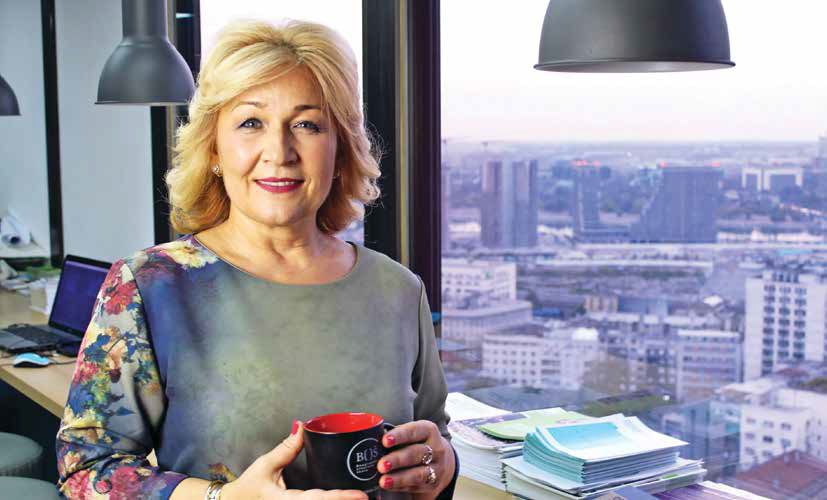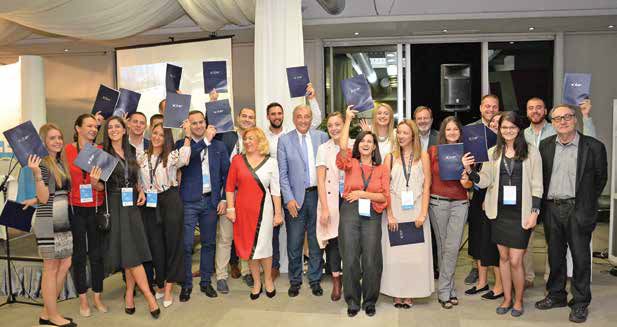As one of the first civil society organizations in Serbia, BOS has been continuously advocating the development of an incentivized environment in which CSOs, media, professional associations, trade unions, universities and all
non-partisan and non-violent structures will act as a network of stakeholders responsible for defending and advancing open and democratic societies.

Were you surprised when you were named as the recipient of the 2018 Diplomacy & Commerce Award, for your long-term contribution to the development of civil society in Serbia, and furthermore, how often are values of the civil sector recognized in society?
— We were surprised, but also quite happy. This year, Belgrade Open School celebrates its 25th birthday, and the significant results that were accomplished in this quarter of a century. All these years, we have worked hard on improving human resources development and public policies, and boosting the capacities of civil, public and business sectors. Trough educational activities, professional and mentoring support, and research and advocacy
activities, BOS has strengthened the capacities of over 57,000 individuals, and over 300 organizations, institutions and companies. First and foremost, it is the institutions of the state that should recognize these results and achievements, since the good cooperation with organizations and their representatives had the biggest direct and indirect results on their work, activities and objectives. Business community and your magazine, which
focuses mostly on business world and diplomacy, have both acknowledged BOS’ contribution. It makes sense that the business sector is the first to recognize the instigators of change, but it would be commendable if the two remaining sectors did not lag behind much, as well.
What was BOS’ biggest contribution to the development of civil society in these past 25 years?
— As one of the first civil society organizations in Serbia, BOS has been continuously advocating the development of an incentivized environment in which CSOs, media, professional associations, trade unions, universities and all non-partisan and non –violent structures will act as a network of stakeholders responsible for defending and advancing open and democratic societies.
Over the course of its work, BOS has been working on putting its experience and the know-how in use trough writing projects, research and providing educational, professional and financial support to other civil society organizations.
Civil society has an important role in regional cooperation, and BOS is among the first organizations that has established it, and implemented networking projects aimed at solving the problem that countries in the region face.
BOS’s success is measured trough a number of established partnerships in which BOS has always sought to be a bridge between civil, public and private sectors. Some of the civil society initiatives and networks that BOS founded or co-founded include discussions about the EU Accession negotiations, Coalition 27, and the Good Energy Network as a part of the environmental protection field. BOS is also a member of several international networks, such as the
Network of Institutes and Schools of Public Administration in Central and Eastern Europe.
Your portfolio comprises of educational, research and advocacy activities. How challenging is it to manage such a versatile organization?
— Managing, mentoring and developing mostly young people comprised out of different competencies with the goal of them being able to carry out complex and always innovative activities on a daily basis, is very challenging. On the other hand, it is quite motivating. BOS is a story about people. A story about students, lecturers, researchers, associates and partners. It is a story about a common desire to learn, change and contribute to the resolution of social problems. When I look back at the past 25 years of our organization and all the challenges and changes that we went through, I can say with certainty that we at BOS, have shaped and developed our organization, and transformed something which, at first glance, seemed incompatible, into something that is definitely complementary and highly practical.

Young people are quite proud of attending the BOS educational programmes, and oftentimes, over the course of their professional careers, they tend to stay in touch with other BOS students. What is it that you offer, that cannot be found as a part of regular educational programmes?
— When you have the opportunity to gather, and then work with the best students of Belgrade universities for an entire year, it does not seem that hard to connect with them, get to know them, help them start their careers, and stay in touch with them long after the programme. We are always focused on the students whom we recognize, educate and nurture as future instigators of important changes in our society. We are now getting together and working with the Alumni Network, which counts over 1200 people that were a part of our main multidisciplinary oneyear programme.
BOS dedicates itself fully to each generation of its students – it nurtures and develops them with the help of a wealth of knowledge and expertise, and even more importantly, love and dedication, which is often left out of formal education. They know that they are at the very core of BOS, and that everything we do, we do for them, with them. We have been creating the great BOS family for years, that is interlaced with commitment, knowledge and love. I believe that the feeling of belonging to this sort of elite of spirit and knowledge is the reason why they feel so affectionate towards BOS.
Is there a straight line of progress in the dialogue between the civil sector on the one hand, and business partners on the other hand, or, is this path laced with challenges? What is the quality of that dialogue today?
— I can see both – the straight line of progress, and many challenges. There are numerous challenges, because we often work on the same things, and we invest a lot of energy and resources without being actually aware that we would achieve better results by coordinating these efforts and communication. There are also examples of excellent cooperation between these three sectors. For years, alongside the Ministry of Youth and Sports, BOS has been implementing projects through which we recruited and selected young people, in order to provide them with internship programmes. During these work practices, BOS also supplied training and career counseling, and as many as 80% of these young people remained working for the companies where they completed their internship.
We also helped companies, and especially small and medium enterprises, with developing mentorship programmes, process of selection, and overall the programme of employee development. The representatives from all sectors are always invited to participate in each of our projects, every initiative for improvement of legislation, and every consultative meeting. Our goal is to recognize individuals, organizations, institutions and companies that are willing to change and improve themselves, their environment and the community in which they work, and respond to common needs through dialogue, networking, creation and advocacy of public policies.
You are one of the long-term advocates of the EU integration. What are your priorities in this segment particularly?
— The European integration remains a priority for us, but there is obvious fatigue coming from the entirety of the process. Serbia’s membership in the EU is constantly overshadowed by political topics, so we are talking very little about the things that are, perhaps, more important to regular people – how to find dignified work, how important education is for us, what we want for our children and young people, what kind of air we breathe, what kind of environment we want, and so on. An open, serious and responsible dialogue regarding these issues is essential – the EU standards and values are not going to change the Serbian society automatically. We have to change ourselves, our way of living, our working habits, and the attitude towards the environment and the community
we live in. That’s how BOS views the European integration process, and that’s how BOS devises and implements its activities accordingly. This implies working on and improving public policies trough concrete proposals for their change, fostering dialogue and connecting key stakeholders, which will enable the application of European standards
and values within the state. In the end, we always have to work with people – individuals in local governments, civil society organizations, companies and large state systems such as ministries, because progress and change begin and end, successfully or unsuccessfully, in relation to how much people believe in them, and how ready they are to fight for them.